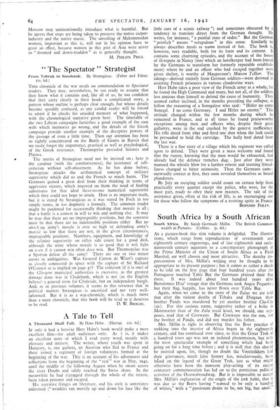"The Spectator" Strategist
THIS chronicle of the war needs no commendation to Spectator readers. They may, nevertheless, be too ready to assume that they know what it contains and, like all of us, be too confident that they carry clearly in their heads a complicated story, a pattern whose outline is perhaps clear enough, but whose details become speedily confused, as any candid reader will be forced to admit if he checks his unaided memory of what happened, with the chronological narrative given here. The timetable of the two Libyan campaigns furnishes a good example of the ease with which memories go wrong, and the details of the Greek campaign provide another example of the deceptive powers of the passage of even a little time. Then our attention has been so rightly concentrated on the Battle of Giants in Russia that we easily forget the importance, practical as well as psychological, of the Greek resistance. Thermopylae preceded Salamis and Plataea.
• The merits of Strategicus need not be insisted on ; here is the candour (with the combativeness), the insistence of self- criticism without self-abasement. As he has done before, Strategicus attacks the arithmetical concept of military superiority which did us and the French so much harm. The Germans gained a great deal from their thinking in terms of aggressive victory, which imposed on them the need of finding substitutes for that ideal three-to-one numerical superiority which they could not hope to attain. Here is an important truth, but it is stated by Strategicus as it was stated by Foch in too simple terms, in too dogmatic a formula. The common reader might be pardoned for occasionally thinking that morale is all ; that a battle is a contest in will to win and nothing else. It may be true that there are no impregnable positions, but the converse must be that there are no indefensible positions either But no attack'ng army's morale is ever so high or defending army's morale so low that there are not, in the given circumstances, impregnable positions. Numbers, equipment, and knowledge of the relative superiority on either side count for a good deal, although the army whose morale is so good that it will fight on even if it cannot win often does win. But Thermopylae was a Spartan defeat all the same! There are one or two minor errors or ambiguities. Was General Carton de Wiart's capture as closely connected in space with the capture of Sir Richard O'Connor as is implied on Rage 47? The criticism (if it is one) of the Glasgow municipal authorities is excessive, as the greatest damage done was in Clydebank, which is not (as the English believe) a general term for Clydeside, but an independent burgh. And, as in previous volumes, it seems to this reviewer that in political matters Strategicus is uncritical and not very well- informed. But it is as a war-chronicle, which is much more than a mere chronicle, that this book will be read as it deserves


























 Previous page
Previous page